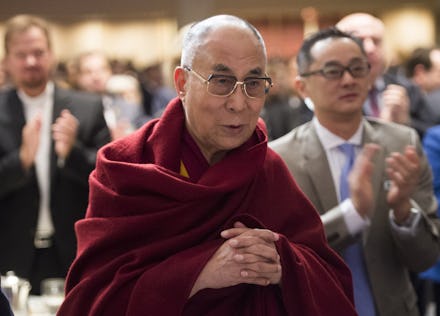China Is Trying to Make the Dalai Lama Reincarnate, And He's Not Having It

For Tibetan Buddhists, reincarnation is a summary evaluation of an being's entire life, subject not to a person's preferences but the whims and justice of the Universe. When it comes to the Dalai Lama, however, that theory goes out the window — at least in regards to China.
On Wednesday, Zhu Weiqun, a top Chinese official noted for his uncompromising views on China's occupation of Tibet, had harsh words in response to the Tibetan Buddhist spiritual leader's continued declaration that he may choose not to reincarnate.
"In religious terms, this is a betrayal of the succession of Dalai Lamas in Tibetan Buddhism," Zhu told reporters in Beijing, according to the New York Times. "The 14th Dalai Lama has taken an extremely frivolous and disrespectful attitude toward this issue. Where in the world is there anyone else who takes such a frivolous attitude toward his own succession?"
Reincarnation is a long-standing tradition in Buddhism, and has been central to choosing the Dalai Lama's successor.
Earlier in the week, Padma Choling, Tibet's Chinese-appointed governor, voiced similar sentiments accusing the Dalai Lama of blasphemy, according to Reuters.
But the most telling aspect of their tirades had nothing to do with blasphemy or even Buddhism itself. Instead, it was the emphatic declaration that China, not the Dalai Lama himself, would decide the fate of his reincarnation.
"Decision-making power over the reincarnation of the Dalai Lama, and over the end or survival of this lineage, resides in the central government of China," Zhu said, according to the Times.
Why is China so adamant? This fight over reincarnation is simply the latest example of the tumultuous relationship between Tibet and China. While Tibet is technically considered an autonomous region of China, relations between the two have a bloody and contentious history. It was brought to the forefront again in 2009, when a number of Tibetans self-immolated to protest Chinese rule.
The Dalai Lama is front and center in the conflict: He has made it clear that he doesn't support Tibet as it currently stands under Chinese rule, and he was exiled to India in 1959 after a failed uprising against the Chinese government.
But he also wields an enormous amount of influence in Tibetan culture, and any successor would have similar power. Hence, it's in China's best interest to allow the reincarnation process to continue, in part because the Chinese government could conceivably install one of its own in the Dalai Lama's place. Reuters notes that a similar incident occurred in 1995: The Dalai Lama declared a Tibetan boy as the reincarnation of the former Panchen Lama, another high-ranking Tibetan Buddhist, but China placed the boy under house arrest and picked its own replacement.
Cutting off any chance of a successor would, in essence, be a symbolic gesture, akin to sticking one's tongue out on the way to the door.
The New York Times' Chris Buckley explains further:
The dispute over reincarnation has profound implications for Beijing and its hold over Tibetan areas, where protests and self-immolations have brought into focus simmering discontent. The Chinese government is determined to manage all aspects of Tibetan Buddhist tradition, including the most sacred rituals of succession, to ensure that the restive region remains firmly under Chinese control.
According to the Dalai Lama's website, "the person who reincarnates has sole legitimate authority over where and how he or she takes rebirth and how that reincarnation is to be recognized," but it's clear that China doesn't see things this way.
However, as Lobsang Sangay, prime minister of the Tibetan government-in-exile, told Reuters, that's too damn bad.
"It's none of Padma Choling or any of the Communist party's business, mainly because Communism believes in atheism and religion being poisonous," he said. "It's like Fidel Castro saying, 'I will select the next pope and all the Catholics should follow.' That is ridiculous."